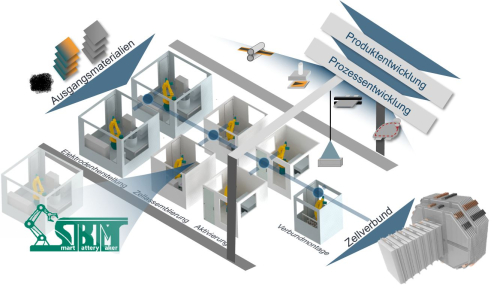
For batteries to fit into narrow and crooked spaces and to store more energy for e.g. electric mobility, flexibly adaptable cells are required. So far, however, lithium-ion battery cells have been produced in standardized formats and rigid systems. Under the AgiloBat project researchers in Germany have developing an agile production system for flexible battery cell production in terms of format, material, and quantity. Phase 2 of the AgiloBat project has now begun and is funded by the German Federal Ministry of Education and Research (BMBF) with a total of €14.5 million, Greencarcongress.com reports.
“Intelligent and sustainable battery cell production is of decisive importance to future mobility, but also to electronics used today, such as smartphones. Within the AgiloBat2 research project, KIT-Karlsruhe Institute of Technology researchers and our partners from science work on enabling agile production in Germany. With an agile production system, battery cells can be adapted individually to the respective requirements—and this will open up many new opportunities.” said President of KIT, Professor Holger Hanselka.
AgiloBat1 started in 2020 as a mere development and concept phase of the Innovation Campus “Future Mobility” (ICM) funded by the Baden-Württemberg Ministry for Science, Research, and the Arts. The BMBF-funded implementation phase, AgiloBat2, started in January 2021 as part of the Intelligent Battery Cell Production (InZePro) competence cluster. All findings obtained in this implementation phase will be incorporated in the development project.
Under AgiloBat2, an agile production system will be set up at the Karlsruhe Research Factory. First, the team of researchers will design the adaptable production plant. Adaptability will be achieved by the setup of a digital twin that realistically models both the overall process and individual processes. In this way, the system can be configured quickly based on the characteristics chosen. In parallel, the production system proper is constructed.
“We will set up an agile production system at the Karlsruhe Research Factory. It will differ considerably from all production systems used for battery cell production so far. Contrary to currently established rigid production lines, our system will be scalable. This will enable economically efficient production of small to medium quantities of various materials and formats.” commented Professor Jürgen Fleischer, Head of KIT’s Institute of Production Science (wbk) and initiator and head of AgiloBat1 and AgiloBat2.
Standardized robot cells will accommodate the production modules. There, the steps to produce various formats will take place. Parallel to production, quality assurance will prevent rejects.
Testing of the modular systems will start in 2022. Both projects will be completed in late 2023 by the final evaluation of the agile production system and the corresponding cell design.
The AgiloBat2 research project is carried out by the wbk Institute of Production Science in cooperation with the KIT’s Institute for Applied Materials – Energy Storage Systems (IAM-ESS), Institute for Mechanical Process Engineering and Mechanics (MVM), Institute of Thermal Process Engineering (TVT), the Thin Film Technologies (TFT) Group, and the Fraunhofer Institute for Chemical Technology (ICT).



